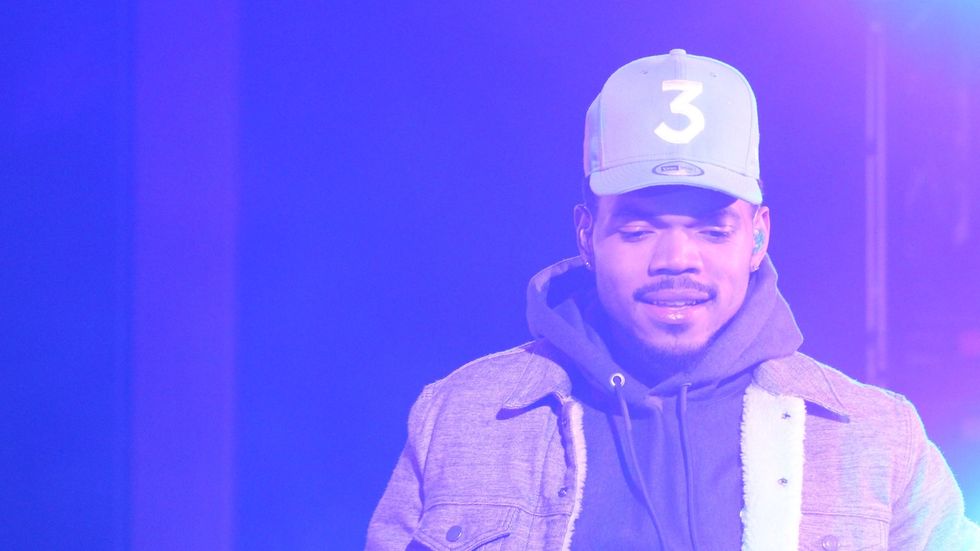Not too long ago, the acclaimed and popular Chicago artist Chance the Rapper performed a new song entitled “First World Problems” with Daniel Caesar on the "Late Show" with Stephen Colbert.
The song contains a soft acoustic guitar accompaniment by Daniel Caesar as Chance raps about the problems he faces now that he’s achieved fame and “the American dream.” The title of the song, therefore, stems from how he is now rich and famous with nothing to complain about but is still finding new problems that come up in his life. Chance mentions his relationship with his daughter, for instance, and how he wishes he could spend more time with her:
“I’m a rich excuse for a father / You just can’t tour a toddler / She turnin’ two, she don’t need diapers, she just need her papa.”
Chance also talks about not being able to come home as often and getting recognized in public as he, of course, incorporates scripture as metaphors for his situation.
What’s interesting, however, is that this song awoke no real feelings of sadness in me. The accompaniment didn’t put me in the mood that Chance was in, and his lyrics, while clever as always, did not make me emotionally invested in the song either. This is not because I don’t relate to issues like not being able to come home as often (after all, I am a college student), but because the central message of the song put me off entirely.
The chorus of the song goes:
“The day is on its way, it couldn’t wait no more / Here it comes / Ready or not.”
Despite Chance’s rapping about all the trouble he is going through, the ultimate message of the song is still optimistic. Furthermore, the quiet guitar accompaniment didn’t make me feel upset for Chance, but rather at ease, tranquil even, though Chance is supposed to be extremely frustrated by the problems he’s mentioning in the song. Essentially “First World Problems” is just like any of Chance’s other tracks: a song about positivity and religion.
Though I’m a fan of Chance myself, I’ve noticed this tendency of his to be repetitive in his music. Though he certainly has a lot to be grateful for and the full freedom to express his gratitude to his God, he isn’t growing into a versatile artist by constantly sending his listeners the same message through his music. Even his “sadder” songs like “Same Drugs” still have positive messages at their core. “Same Drugs” leaves the listener with the message “All you need is happy thoughts” instead of having the message divert from Chance’s usual positivity. This essentially limits Chance to be one specific type of rapper. People now listen to him only for his blend of gospel and hip-hop and the good vibe he gives off. This makes him both less versatile and exclusive from those who listen to hip-hop to hear about struggle and coping with loss, imperfection, or insecurity.
Chance’s continuous optimism also influences other hip-hop artists of the present. By showing how one can achieve amazing success as a musician by limiting themselves to a specific subgenre of hip-hop, he is encouraging other rappers with the potential to stay within their comfort zones. Migos releasing an album about their struggles in Atlanta or Lil Yachty releasing a single in which he actually talks about his own insecurities would shine a whole new light on these artists, and yet they know they can achieve success by producing only “hype music” because it’s worked for Chance to stay in his comfort zone as well.
On the other side, what makes artists like Kendrick Lamar and JAY-Z legends is their versatility; Kendrick Lamar can produce a chart-topping single like “HUMBLE.” and talk about his inner demons on “FEAR.” on the same album, and JAY-Z releases classics like “The Blueprint” for the masses and 16 years later produces “4:44,” his most introspective album to date.
Ultimately, though, Chance can also stay in his lane and define himself as an artist who raps only about faith and optimism. He will continue to get praise for his music regardless of whether he’ll change the content of his music or not. Like he said recently in an interview, he is the culture now. But that also means he has a huge responsibility to push the culture in the right direction. And by showing versatility in his music, Chance can encourage all different kinds of artists to continue being themselves and promoting the music they want to create.


















